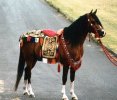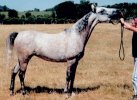| Author |
 Topic Topic  |
|
|
pintoarabian
Gold Member
   
Scotland
1242 Posts |
|
|
simbba
Silver Member
  

299 Posts |
|
|
Sirius
Bronze Member
 
England
102 Posts |
 Posted - 03 Feb 2010 : 9:56:37 PM Posted - 03 Feb 2010 : 9:56:37 PM





|
Just a little request:
Yesterday (2/2/09) I posted our first 4 results on one of the CA threads, before submitting them to the CA website.
Today I checked the international list. Someone had posted our results there before my own submission (described as "on arabianlines.com" in the header - which means how the information was gathered).
Now that's not a problem, except that the person who posted the results got them wrong.
One of the boys is a SCID carrier, incorrectly copied by whoever as clear - see my postings on the CA threads. I would hate anyone to think we were trying to cover up a carrier status, and I hope that I have corrected the error (resubmitted to the CA site and I hope they won't just look at it and say: "weve already got him...")
I suggest that people don't rush in to submit other peoples' results. We don't need an assumption that the owners will try to deceive us: that's paranoia. If you do submit under a sort of freedom of information flag, GET IT RIGHT.
Dom
Seren Arabians
|
Report to Moderator  |
|
|
susan hobson
Silver Member
  

United Kingdom
367 Posts |
 Posted - 04 Feb 2010 : 11:36:30 AM Posted - 04 Feb 2010 : 11:36:30 AM





|
I think that if you are going to breed from your arabs, stallions or mares, you should have them tested.
Even if you have a carrier, as long as you make sure the other horse isn't a carrier, then you are okay. But you have to be honest about it and really think about what you are doing.
I lost a very much wanted foal who the vet thought died of scid, we had her tested but it turned out not to be scid but something similar.
So please everyone think about what you are doing, if you want to breed do the tests.
susan. |
   |
Report to Moderator  |
|
|
szedlisa
Bronze Member
 

Spain
124 Posts |
|
|
Sirius
Bronze Member
 
England
102 Posts |
|
|
szedlisa
Bronze Member
 

Spain
124 Posts |
 Posted - 05 Feb 2010 : 01:44:24 AM Posted - 05 Feb 2010 : 01:44:24 AM





|
Emma Maxwell gave us permission to post her CA article on our CA website and I feel that it is also well suited for this thread:
http://www.cerebellar-abiotrophy.org/index.php?option=com_content&view=article&id=19&Itemid=27
STATISTICS
By Emma Maxwell
20 Jan 2010
Just to make sense of the percentage of carriers in the breed it is worth remembering to calculate how many affected foals are likely to be bred for a given percentage when breeding without access to tests.
A 20% carrier ratio SOUNDS terrible, it means one in five horses is a carrier. However if you bred together a herd of horses in which 1/5 stallions is a carrier and 1/5 mares is a carrier your chances of breeding two carriers together are 1/5 x 1/5 = 1/25. So in 25 matings you only have one chance of breeding a carrier to a carrier. Your other 24 breedings will be clear to clear or clear to carrier, none of which can produce an affected foal. Of your carrier to carrier matings only 1/4 is likely to produce an affected foal so the overall likelihood of breeding a CA affected foal from a herd with 20% carriers is 1/4 x 1/25 = 1/ 100.. Given all your other potential causes of fatality a 1/100 chance is not terrifying enough to call CA a plague.
I agree with SKM that the high rates of carriers in the first 1000 tested horses are likely to be heavily skewed towards testing potential carriers, firstly horses who have produced a suspicious foal, and secondly all the horses who are by or out of a known carrier. Still, we can do the same maths on say a 40% carrier rate to see what results we get. 2/5 x 2/5 = 4/25 chances of breeding carrier to carrier. 4/25 x 1/4 = 4/100 or 1/25 foals affected. Even given misdiagnosis or sweeping under the carpet I do not think we have seen this rate of affected foals in the population at large so I would be confident in assuming the rate is nearer 20%, even given the prolific use of some carrier stallions in recent history.
However with a test available, none of these figures particularly matters as we can avoid ever breeding another carrier to carrier. It should be the case that all owners of stallions who stand at public stud feel obligated to test before asking people for money to breed to their horse. It is then up to the mare owner to decide whether to look elsewhere or test their mare and continue.
Again in the light of the maths, pedigree examination is remarkably unhelpful. It doesn't matter which horses in the past were carriers, because half their offspring will be clear. Only if you have the direct product of a known carrier of CA do you know that chances of your horse being a carrier also are significantly raised. In the first generation your horse has a 1 in 2 chance of also carrying. Yet if you have the grand product of a known carrier, you only have a 1/2 x 1/2 chance of it inheriting carrier status from that grandparent. This ratio ends up at 1 / 4, or 25 %. This is pretty near the suspected rate in the population at large and so it is not a useful predictor that your horse might also be a carrier. Thus naming 'lines that carry CA' is mathematically irrelevant - you cannot make useful predictions armed with a pedigree. Of course we have all been guilty of speculation about who carried it down to the present day, but we should remember that it doesn't actually help us make better choices in the future. You can only make use of the information when it pertains to a particular horse that you are about to breed to another particular horse, only then is it more valuable information to add to the pot before making a breeding choice.
Addendum by Lisa Goodwin-Campiglio:
For a quick way to ascertain the Percentage of genetic influence passed forward from each generation, use the following table:
(F = Generation)
F1 = 50% (parents) 1/2. Has 2 horses in this generation.
F2 = 25% (grandparents) 1/4. Has 4 horses
F3 = 12.5% (great, grandparents)1/8. Has 8 horses
F4 = 6.25% (great, great, grandparents) 1/16. Has 16 horses.
F5 = 3.125% (great, great, great, grandparents) 1/32. Has 32 horses.
F6 = 1.56% (great, great, great, great, grandparents) 1/64. Has 64 horses "
It is also a statistical fact that the greater the number of horses tested ( ie. the broader the base) the more likely the percentage of carriers will drop. With this in mind , Emma´s statement must be heeded well: " carrier to carrier matings only 1/4 [one out of four] is likely to produce an affected foal so the overall likelihood of breeding a CA affected foal from a herd with 20 % carriers is 1/4 x 1/25 = 1/ 100 [one out of four times one out of twenty-five equals one out of one hundred]. Given all your other potential causes of fatality a 1/ 100 chance is not terrifying enough to call CA a plague."
In the general breeding population, just how many of us have bred over one hundred foals?
No way could the presence of CA be considered a ´plague´. It is the sensible thing though to try to avoid having an affected foal, to use known carriers with responsible breeding selections and to be informed.
For those who chose to use it, the present CA test is a very useful breeding tool.
|
Spanish Arabians Photos
http://www.flickr.com/photos/szedlisa/collections/72157600851198212/
Cerebellar Abiotrophy (CA) Info:
http://www.cerebellar-abiotrophy.org/
|
Report to Moderator  |
|
|
Lindsay
Gold Member
   

Scotland
944 Posts |
 Posted - 05 Feb 2010 : 6:39:17 PM Posted - 05 Feb 2010 : 6:39:17 PM





|
| Just out of interest has anyone used VHL Genetics in the netherlands and sent hair? If so how did you send it along with the form as i am just about to get my mare tested |
   
Paidir dóibhsean le fiántas ina gcroíthe acu, atá coinnithe i gcaighin |
Report to Moderator  |
|
|
linda
Platinum Member
    
United Kingdom
1772 Posts |
 Posted - 05 Feb 2010 : 10:10:44 PM Posted - 05 Feb 2010 : 10:10:44 PM





|
Hi Lindsay,
I put each hair sample in a clean sandwich bag and labeled it with the horses name, together with the form, (separate envelope for each horse) and repeated this for each horse and then put all the smaller envelopes in a larger envelope and posted them,
Good luck
Lx |
     |
Report to Moderator  |
|
|
Lindsay
Gold Member
   

Scotland
944 Posts |
 Posted - 06 Feb 2010 : 6:50:40 PM Posted - 06 Feb 2010 : 6:50:40 PM





|
| Thanks Linda just doing the one so will get that done this weekend. |
   
Paidir dóibhsean le fiántas ina gcroíthe acu, atá coinnithe i gcaighin |
Report to Moderator  |
|
|
gu-ku-vi
Gold Member
   
Denmark
744 Posts |
 Posted - 08 Feb 2010 : 09:41:51 AM Posted - 08 Feb 2010 : 09:41:51 AM





|
I have stopped to write so much here, but now I want to do it again in this matter. Off course all arabians used for breeding shall be tested and people shall talk about SCID,CA,LFS a.s.o. openly. In the stable, over the coffee,in forums, everywhere, so all people know, that here, there are some things, they have to pay attention to.Not about the single breeder, but just as a knowledge, that this things is in our breed and we have to be carefull.Especially those who use their stallions for other breeds, I think that not many arabianpalominoes/paints has hear about it.
I am thinking of the new people joining the arabian world in hope of starting a small breeding program,( the big ones will survive I am sure)So before you even think about selling a breeding animal or put your stallion for public breeding, itself or the parents, should be tested so the buyers know, what they have to deal with.If you use a carrier you have to test the foals, before even think about selling it.
When I bought my arabians the talk about SCID was hush, hush, I have never heard about it and that was fatal for me.Four of the five horses I bought was carriers of SCID incl. the stallion. Out of four foals, two of them died of SCID. It was so hearthbreaking as I was so eager to start my breeding program and it all fell apart and in fact, I never go back again with the same entiusiamse.
Why?, because that stallion and those mares was the perfect combination and now I find that I couldn´t use them together.
I felt that my horses was put down to a lower status because of that, but I also think, it was because, I was just a small breeder. After all it was not me that spread the genfault all over the world. The only thing I want is to preserve some lines, but unfortunately again the 2009 foals is carriers.
When the "big ones" came up with their staus of Ca openly, it was like they where heroes, but think about that they have to do it, because after all, with all those offsprings, the status will be known after a while.
There where people out there saying that SCID and CA never was in the egyptians, because they where so pure, but they have now recognise that it is not so.
When such a genfault is spread, you will find that those horses you find will fit very well together with your mares, you will see that in many cases you have to reject them, because of the fault and you have to use another, that you don´t like that much.
CA test is very new to the breed, but gosh so many of the wellknown stallions carring this genfault, it is awfull, when you think about how many foals, they have on the ground.
Yes we can use the carriers, but I don´t think it is vise to use them so much as people do with the great matadorstallions. They have hundreds of offsprings a year, where some of them will be clear, and some of them most be good enough to breed from, allthough they perhaps not have the same showmerits.
Many on several forums talk about that they have never seen it in their stables and bla, bla, but I don´t think it is the absolutely truth, they have just hide it away under the carpet, or only talked about it in close cirkels
To day I am happy to have my stallion wich is both SCID and CA clear, the mares is CA clear to, but I still don´t breed so much, because of the scidcarriermares. I feel that my mission is to try to make some offsprings, which is clear, therefore I don´t breed more than two foals every two or tree years, in hope, that someday I have a clear one.
In hope that people will use the test trying to breed the faults out, instead of over and over again use carriers. As long that yoy have domestic lines there are so many good stallions out there you can use.
When the speak come to the pure Spanish, the Crabbets and egyptians and other small lines, it is a different story as the breeding material is not that big in this lines, but still, it most be of great importens, trying to breed it out. Here I am not saying that a clear one is better than a horse with others defect t.x. legs a.s.o., but I am sure they are out there anyway. Try to have a close look in the corners around in the country, I am sure that many of them are out there, not doing the great shows, but of the quality.
Best of it all is, that you don´t risk to breed a carrier to a carrier, but because you will have a healthy and sound foal, you don´t have to ASK for a carrier, unless you want to try to have a clear one after that horse especially, and when you have it, then stop spreading the fault or at least tell about it in the open.
KR Gunni. |
Edited by - gu-ku-vi on 08 Feb 2010 10:10:40 AM |
Report to Moderator  |
|
|
Zenitha
Gold Member
   

England
1078 Posts |
 Posted - 08 Feb 2010 : 7:08:20 PM Posted - 08 Feb 2010 : 7:08:20 PM





|
Gu-ku-vi - that is so so sad for you, and exactly what we wish to avoid happening to any other innocents out there  |
|
Report to Moderator  |
|
|
debs
Platinum Member
    
United Kingdom
3218 Posts |
|
|
Valentine Arabians
Gold Member
   
United Kingdom
586 Posts |
 Posted - 15 Feb 2010 : 11:46:02 AM Posted - 15 Feb 2010 : 11:46:02 AM





|
We have just had our CA results back on 2 siblings, both are clear. They are VA Mia Valentina, 9 year old mare and VA Mitraz, 7 year old stallion. Mitraz was also tested for SCID and is clear.
We sent the manes to dr. vvan haeringen in Holland and found them very easy to deal with. |
Liz & Walter Downes
www.ValentineArabians.com
Lincolnshire |
Report to Moderator  |
|
 Topic Topic  |
|
|
|

